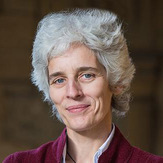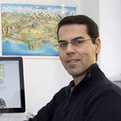Jornada Científica BGSMath
Jornada Científica BGSMath
Marino Arroyo
The session took place at IEC, between 10 a.m. and 1 p.m.
In the morning there were two mathematical talks, given by Ulrike Tillmann (Oxford) and Marino Arroyo (UPC).
In the afternoon there was a plenary meeting of the Scientific Advisory Committee.
T1 Classroom
Presentation
10.15 – 11.15
Ulrike Tillmann (University of Oxford)
11.15 – 11.45
Coffe break
11.45 – 12.45
Marino Arroyo (UPC)

The concept of cobordisms has played an important role in the study of manifolds. Thom’s theorem in the 1950s, which computed the cobordism classes via homotopy theory, was a milestone in the classification of manifolds. In the late 1980s cobordisms played a central part in Atiyah and Segal’s axiomatic approach to topological quantum field theory.
These two seemingly very different appearances of cobordisms have more recently been brought together, one informing on the other.

Euglenids are unicellular aquatic organisms capable of moving either by beating a flagellum or by executing dramatic and harmonious shape changes, whose function still remains unclear. These shape changes are accomplished thanks to a complex structure underlying the plasma membrane, made of interlocking proteinaceous strips, microtubules, and motor proteins. Based on simple observations of euglena under the microscope, I will describe the mechanisms by which the sliding of pellicle strips leads to shape control. Then, I will describe models to understand how these shape deformations lead to cell locomotion. I will discuss how, combining this mathematical modeling and experiments, it is possible to shed new light into the biology of euglena and also design new bio-inspired materials.
